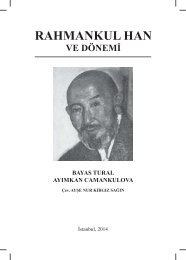THE SOVIET HISTORIOGRAPHY AND THE QUESTION OF KAZAKHSTAN’S HISTORY
SOVYET-TARIH-YAZICILIGI-ENG
SOVYET-TARIH-YAZICILIGI-ENG
Create successful ePaper yourself
Turn your PDF publications into a flip-book with our unique Google optimized e-Paper software.
<strong>THE</strong> <strong>QUESTION</strong> <strong>OF</strong> <strong>KAZAKHSTAN’S</strong> <strong>HISTORY</strong> 11<br />
ERMUKHAN BEKMAKHANOV <strong>AND</strong> IDEOLOGICAL REPRESSIONS<br />
<strong>AND</strong> LIMITATIONS IN <strong>THE</strong> RESEARCH <strong>OF</strong> KAZAKH <strong>HISTORY</strong><br />
IN <strong>THE</strong> <strong>SOVIET</strong> PERIOD<br />
Prof. Dr. Abdulvahap Kara *<br />
Historians in the Soviet Union had to work within the confines of<br />
Marxism-Leninism ideology. As scholars paid attention to the confines<br />
and served the Soviet ideology to receive awards and honors, others<br />
that behaved on the contrary were blocked from being promoted and<br />
even sentenced to various penalties that had severe consequences<br />
such as death and deportation to labor camps in Siberia. However,<br />
sometimes, sudden changes in the ideological fields to which historians<br />
were subjected occurred, especially during the Stalin era. This<br />
caused historions to remain in difficult situations and to be sentenced<br />
to heavy punishment. One of the most concrete examples of these<br />
historical episodes was Ermukhan Bekmakhanov, a Kazakh historian.<br />
During World War II Bekmakhanov started to conduct and write<br />
research about Kenesary Kasymuly, who led a powerful rebel movement<br />
against the Tsarist Russia hegemony, which pitted him against<br />
the Soviet government, the last Kazakh Khan. It was the demands<br />
of the regime at that time. Stalin wanted that all pre-1917 Ocotber<br />
Revolution national heros be praised in order to give courage and<br />
spirit to the troops. But, Bekmakhanov’s completed doctoral thesis<br />
coincided with the aftermath of the war. In this period, Stalin instead<br />
determined to restrict national heroes that he promoted before the<br />
war and to put forward and praise the Russian people and their role<br />
in the victory. Therefore, Bekmakhanov’s research conflicted with the<br />
Soviet government’s ideology in 1947 when he finished the doctoral<br />
thesis, which he began writing in 1941 and coincided well with the<br />
objectives indicated by the Soviet elites. For this reason, it can be<br />
said that his writing did not run contrary to the ideology, but it was<br />
unable to match the rate of change within Soviet ideology and his<br />
historical perspective and methodology. His resistence to the pressure<br />
to change what he wrote that fit with the pre-war ideology<br />
culminated in a 25-year exile to Siberia. He was eventually pardoned<br />
and returned home in 1953 after Stalin died and Khrushchev, with his<br />
anti-Stalinist policy, took power.<br />
Historiography has not always been consistent in terms of ideological<br />
methods and goals in the Soviet Union. It changed from time<br />
to time as shown in the case of Bekmakhanov. This essay will try to<br />
* Mimar Sinan Güzel Sanatlar Üniversitesi Fen-Edebiyat Fakültesi Tarih Bölümü



